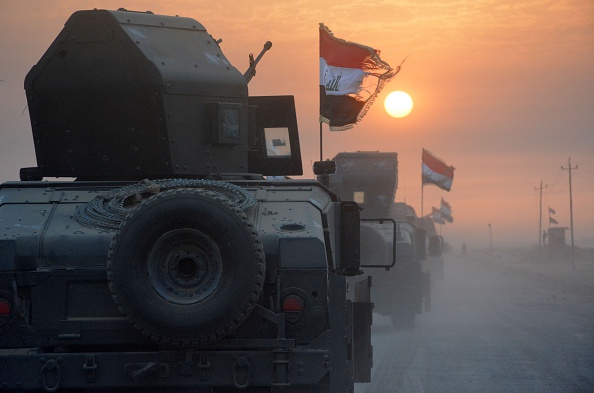
It’s just over 300 miles from the Iraqi city of Mosul to the Syrian city of Aleppo. They’re less than an hour apart by F-16 warplane. Yet the distance, if measured in acts by the civilized world to save each town’s beleaguered civilians, might as well be measured in light years. The reason, bluntly put, is simple bad luck, leavened with realpolitik.
The Iraqi military, backed by Kurdish and U.S. allies, launched on Monday its long-awaited offensive to take back Mosul from the ISIS militants who have occupied it for more than two years. Alarms quickly sounded about the fate of the 1 million civilians in Iraq’s second-largest city. “Those who try to flee will be forced to navigate a city covered with booby traps, snipers and hidden landmines,” warned Aram Shakaram, an official with the non-profit group Save the Children based in Iraq. “Without immediate action to ensure people can flee safely, we are likely to see bloodshed of civilians on a massive scale.”
Yet for four years, the residents of Aleppo, Syria’s largest city, have also been subject to bloodshed on a massive scale. The air force of Syrian President Bashar Assad, joined in recent months by Russian airpower under the command of Vladimir Putin, have routinely bombed civilian neighborhoods in Aleppo. While the world has protested, and non-governmental groups have struggled to save lives, the world’s militaries have sat on their hands as the slaughter has unfolded. The Syrian civil war has killed 400,000, and driven 8 million from their homes, half of whom have left the country.
Russia announced Monday that it would suspend air strikes in the rebel-held eastern part of the city for eight hours Thursday after such an attack killed 10 children.
It was a bizarre juxtaposition Monday afternoon: the Pentagon explaining how it would try to ease the humanitarian crisis in Mosul while death rained down on innocent kids just to the west. “We do have concerns about the humanitarian situation that would follow the military operations,” Pentagon spokesman Peter Cook told reporters about Mosul. “There are plenty of people in the United States government who are tracking this and working very closely with the international community to address the very serious concerns here.”
Some lawmakers didn’t think much of Moscow’s bombing moratorium. “Russia’s announcement of a ‘humanitarian pause’ to its war crimes in Aleppo gives new meaning to the term ‘Orwellian,’” Sen. John McCain, the Arizona Republican who chairs the armed services committee. “Russian and Syrian aircraft are using every kind of bomb in their arsenals—incendiary bombs, thermobaric bombs, barrel bombs, and more—to kill civilians in Aleppo.”
Much of the difference is due to bad fortune. ISIS’s taking of Mosul in June 2014 was a direct punch to the U.S., which had invaded Iraq in 2003 and spent $25 billion rebuilding a second Iraqi army after it cashiered the first one shortly after occupying the country. Leaving northern Iraq in the hands of jihadists would make clear to the world that the U.S. invasion had been a waste of 4,500 American lives. Even a Democrat like President Obama, who opposed the war launched by his Republican predecessor, George W. Bush, couldn’t tolerate such an outcome.
Aleppo, in contrast, is a Syrian problem between Assad and the dozens of rebel groups seeking to topple him. In global affairs, there is always a greater reluctance to intervene in another state’s internal strife. It’s an easier call when outsiders—like ISIS seizing Mosul in 2014, or Saddam Hussein seizing Kuwait in 1990—seek to redraw international boundaries by force. Internecine fights—Korea, Vietnam, Yugoslavia, Iraq 2.0 and Afghanistan come to mind—are always messy and hard for outsiders to manage, never mind impose an outcome.
In some cases, there’s also a greater willingness by organized states to take on non-state actors like the Islamic State. Diplomats and military officers of any nationality thrive in bureaucracies, and tend to be conservative when it comes to upsetting the status quo. Organized states tend to have allies—Syria boasts Russia and Iran, for example—which makes taking them on more complicated than attacking a self-declared pop-up caliphate.
More Must-Reads from TIME
- Why Biden Dropped Out
- Ukraine’s Plan to Survive Trump
- The Rise of a New Kind of Parenting Guru
- The Chaos and Commotion of the RNC in Photos
- Why We All Have a Stake in Twisters’ Success
- 8 Eating Habits That Actually Improve Your Sleep
- Welcome to the Noah Lyles Olympics
- Get Our Paris Olympics Newsletter in Your Inbox
Contact us at letters@time.com